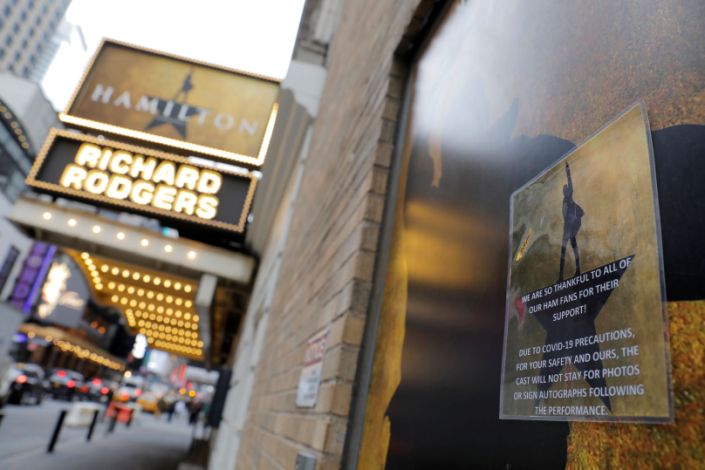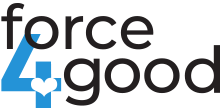Broadway community comes together to start sewing and delivering protective gear to New York City hospitals

New York City has become the epicenter of the coronavirus pandemic in the United States, with over 10,000 diagnosed cases. The virus has shut down the city’s famed cultural institutions and left area hospitals in dire need of protective equipment for health care workers and patients.
But since late last week, members of the Broadway theater community have come together and launched a program, the Broadway Relief Project, that is set up to sew thousands of gowns and masks for the city’s health care workers and hospital patients.
Javier Muñoz, who has starred in the musical “Hamilton,” is one of the people who helped coordinate the effort. For Muñoz, it began last Friday when he started thinking that the many tailors who work on Broadway could be put to work sewing protective masks.
“That’s how I approached this. It was like, I know people. I know a lot of people. How can I connect everyone so that we can do this together?” Muñoz said in a conversation with Yahoo News. “Because I can’t stitch a thing, but I know a ton of people who can.”
As he began trying to kick-start his plan, Muñoz ended up getting involved with a team effort that included tailors and costume makers. He was introduced to Molly Braverman, director of the Broadway Green Alliance, a group that focuses on encouraging environmentally friendly practices in the theater industry. Braverman was in touch with organizations that had supplies of fabric that could be repurposed for use in hospitals.
Muñoz also linked up with Bruce Barish, CEO of Ernest Winzer Cleaners, a family-owned laundry company in Manhattan that has dry-cleaned Broadway costumes for over a century. Barish offered his fleet of vans to transport the supplies and finished masks.
“To me, this is such a beautiful example of what the theater community does best,” Braverman said. “In three days we went from lots of people trying to help in different places to a fully fledged project.”
Muñoz said he was heartened to see so many of his colleagues willing to help during this crisis.
“This is so beautiful because the moment I just wanted to do something, I found a sea of people doing the exact same thing.”
But it wasn’t an easy road. Even with tailors, fabric and transportation in place, there were still a number of questions that needed to be answered before sewing could begin.
Muñoz said he had not received responses to his offer of help from the New York City mayor’s office or the office of New York Gov. Andrew Cuomo. It was unclear where they could get instructions for making the gear and how to deliver it. They also wanted answers about whether the dry-cleaning vans would be allowed to move through the streets given new, potentially tightened restrictions.
Muñoz ended up getting in touch with the office of Brooklyn Borough President Eric Adams, who has set up a website to serve as a clearinghouse for requests for help and offers of assistance. Adams’s office told him there was a greater need for gowns than for masks. The office also helped him address logistical questions, find guidelines for making gowns and put him in touch with the New York City Economic Development Corporation, which is responsible for managing several emergency response efforts in this crisis.
The group was told dry cleaners and laundromats have been deemed essential businesses in New York and Barish’s vans would be able to move through the city amid a shelter-in-place order.
However, they still needed a space to serve as a workshop for the tailors and as storage. Any space needed to be big enough for people to work while staying 6 feet apart, following the new social distancing guidelines that have been issued to stop the spread of the coronavirus.
On Saturday night, they connected with Jeff Whiting, CEO of Open Jar Studios, an approximately 8,000-square-foot space in Manhattan’s theater district. Whiting had been working on his own to launch a mask-making effort in conjunction with Manhattan Borough President Gale Brewer. The groups joined together under the umbrella of Whiting’s Broadway Relief Project, which is using his space to manufacture protective gear.
According to Muñoz, even once all this was in place, a crucial component was missing — the sign-off from local officials so the protective gear could be accepted and used by the hospitals.
“The big problem here was how to get the attention from the city and how to get the proper CDC-regulated instructions to build the things so we weren’t just wasting material and our time,” he explained. “That was the hardest hurdle to jump.”
In the past week, some U.S. hospitals have asked for volunteers to sew cloth masks, which can be used as a last resort amid the shortage of N95 masks, which have filters to block microscopic particles. There have been multiple efforts to meet the need, including from fashion designer Christian Siriano and the Costume Designers Guild in Hollywood.
Barish, whose dry-cleaning trucks are being used for the Broadway Relief Project, explained that it’s important to coordinate with officials to ensure any hand-sewn products are needed locally and made to proper specifications.
“There have been people that have said, ‘Why don’t we just start making masks?’ And what Javier and myself and a few other people were finding out is that didn’t seem to be the most important need,” Barish said. “It’s great that there are people at home doing this, but I think those masks are really for you and me at this point.”
As the Broadway groups came together, they still did not have a green light from any local official to begin producing gear.
“We were trying to scream and yell as loudly as we could,” Muñoz said. “Finally I just … had a fit and I went onto Twitter and I just yelled.”
Muñoz’s tweets to his more than 100,000 followers brought in new offers of help and attention. At one point, Maya Rupert, who managed Julián Castro’s presidential campaign, was helping contact and coordinate with elected officials. Muñoz heard from the governor’s office and New York City Council Speaker Corey Johnson, but he still didn’t have a green light.
On Monday, Adams, the Brooklyn borough president, told Yahoo News he was authorizing the Broadway Relief Project to begin producing masks and gowns. Adams said he would ensure that the equipment met proper specifications and would reach health care workers in need.
“It is a critical moment for elected officials to step up and do more than usual to protect New Yorkers, to ensure they have access to vital services and information. My office and I take that responsibility very seriously, and we will be watchdogging the procurement, production and delivery of these medical supplies because there is no time for delay from the city, state or federal government,” Adams said.
“I have mobilized Brooklyn Borough Hall into a remote clearinghouse for people who need help or want to give help; please visit my website to get involved.”
Muñoz was overjoyed to hear sewing could begin. He said the Broadway Relief Project has over 100 stitchers “itching to get started on something” who can make thousands of gowns and masks each day.
“All the cooks in the kitchen managed to get the attention and get things moving,” Muñoz said. “It could not be truer to the Broadway theater community. It really is exactly what we do. We collaborate and we make the thing, and there is no one superstar. It’s all of us, and we all, we’re trying to make this happen.”
